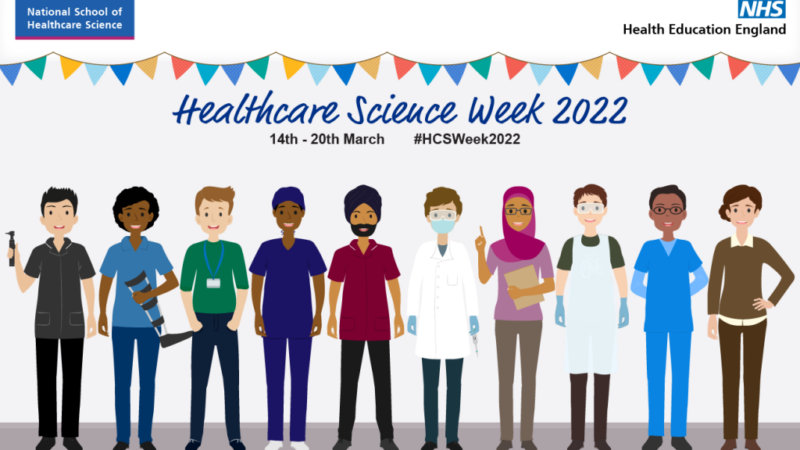
Healthcare science staff play a vital role in the prevention, diagnosis and treatment of a huge number of medical conditions. They also help people live independent lives through rehabilitation.
This week (14 to 20 March) is Healthcare Science Week, a chance to celebrate the amazing work of Healthcare Scientists in the NHS. The profession represents 5% of the NHS workforce, yet their work underpins 80% of all diagnoses. With more than 50 healthcare science specialisms, it’s not surprising that many healthcare professionals have little idea about healthcare science roles, which include life sciences, physiological sciences, bioinformatics and medical physics and clinical engineering.
Healthcare Scientists are often our forgotten workforce within the Trust. We wanted to use this opportunity during Healthcare Science week to try and raise their profile to their colleagues. Working across many departments in both patient facing and behind the scenes roles they perform critical tasks which aid the prevention, diagnosis and treatment of disease. Here are some examples of areas that HCS work in for our organisation.
Healthcare scientists deliver high quality, evidence-based scientific services, tackling major priorities in health such as cancer, coronary heart disease, Stroke, COPD, long-term conditions, personalised medicine and moving services closer to the patient, through research, innovation and education.
Recently Healthcare Scientists and Healthcare Science Trainees have performed vital work in the fight against COVID-19, working on vaccine development, testing for the disease and preparing equipment needed to treat patients, such as ventilators.
A huge advantage of a healthcare science role is that ‘every day is a school day’ – for people who are curious and enjoy learning, the field offers many opportunities for continuing professional development and learning. Meet some of our healthcare scientists working across UHSussex.

Brian is our clinical engineering services manager for the Royal Sussex County and Princess Royal Hospitals. Brian’s department is responsible for managing and maintaining around 22,000 patient-connected medical devices, worth around £70m.
These include intensive care ventilators, defibrillators, infusion pumps, patient monitors, OBS equipment, neonatal care equipment and anaesthetic machines.
The team of eight highly skilled engineers responds to more than 6,000 clinical equipment repair requests each year and carries out more than 3,000 planned tasks and provides technical admin support and the equipment maintenance logistics service.

Mohammed leads the team for specialist diagnostics for our Trust and the south east network. Throughout the Covid-19 pandemic, Mohammed has worked as the clinical and laboratory lead for our expert virology and microbiology response. He led the team to be the first in our network to offer Covid-19 testing in April 2020.
Mohammed is proud of the team’s achievement to get the local test turn-around time down to within 12 hours and the introduction of rapid PCRs with turn-around time of less than 2 hours, which really gave tremendous support to patients, infection control and bed management teams. The team built on this success in June/July 2021, when it became the network laboratory for Covid genotyping.

Kade is a clinical scientist in the biochemistry department at the Royal Sussex County Hospital. His role involves running tests (e.g. UEs, LFTs, TFTs) on body fluids (e.g. blood, urine, CSF, faeces) and ensuring the results are correct.
Kade also develops new laboratory tests, teaches scientific and medical staff, carries out research, and offers clinical advice to clinicians on the correct use and interpretation of biochemistry tests.
His role is very varied and involves working in the laboratory as well as occasionally assisting with ward rounds.

Amy is a healthcare scientist in molecular diagnostics. Her role is both clinically and in service delivery. She works closely with healthcare scientists and pathologists in cellular pathology and haematology oncology.
Recent advances in genomic medicine are changing the way healthcare is being delivered across the NHS. One key area where genomics is benefitting our patients is the increasing number of therapeutic options available for cancer treatment.
Amy’s job is to interpret molecular analysis of patient tissue after a cancer diagnosis. This determines whether mutations with therapeutic targets or implications are present, so the clinical oncology team can make sure the patient receives the most effective treatment for their cancer.